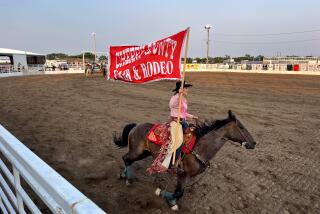Maine Has a Role Model for Ventura
AUGUSTA, Maine — Memo to Gov.-elect Jesse Ventura of Minnesota:
If you’re wondering how an Independent governor can arm-wrestle the legislature, tap-dance with the big guys in Washington and maybe, just maybe, follow through on a few campaign promises, talk to Angus King.
The 54-year-old former poverty lawyer this month grabbed more than 60% of this state’s votes in a reelection bid against three opponents so undistinguished that one local pundit called them “two stooges and a fireplug.” Maine’s Democratic and Republican party organizations all but conceded victory to the relentlessly centrist incumbent, an Independent governor who came through on first-term vows to balance an out-of-whack budget, streamline state government and raise school standards.
True, King lost a major battle to curb clear-cutting in Maine’s forests (“My biggest disappointment,” he said), and the gay-rights bill he sponsored went down to defeat in a citizens’ referendum. But even his critics say his victories outnumber his losses.
The reason for his popularity is simple, King said: Voters are sick of empty promises and hollow rhetoric; they crave authenticity, even if it sometimes comes in eccentric packaging.
“I think people have very sensitive [expletive] antennas,” he said. “They know when they’re being conned, and they have a deep-seated desire to have people tell them as it is, even if they don’t want to hear it.”
With an open-door policy that has won confidence from Democrats and Republicans alike, King has put the lie to the notion that an Independent governor can’t build a power base or establish coalitions. He has consistently positioned himself as “both anti-establishment and a moderate,” said University of Southern Maine public policy professor Charles Colgan, and thus “has come to stand for some restraint against the wilder inclinations of both parties.”
The composition of the state Legislature has changed during King’s tenure, and Democrats currently control both houses. Senate President Mark W. Lawrence, a Democrat, praised King for the degree to which he has been engaged in the legislative process. But King can have a short temper sometimes, Lawrence said, and “every once in a while, maintains this attitude, you guys are all politicians and I’m not--kind of this superior attitude.”
Lawrence said King’s success has come mainly from “playing the Republicans against the Democrats, keeping us at odds from each other, and then assuming the role as middleman.” But for the most part, Lawrence said, King is “honest and open” with his legislative colleagues.
‘You See Him Around All the Time’
Equally important, he connects with his constituents. Virtually the entire state knows him as “Angus,” a lanky, likable governor who goes on QVC-TV to hawk Maine products and allows himself to be dipped in a dunk tank at a small-town fair.
“You see him around all the time,” said Debbie Colomy, the 36-year-old owner of a used bookstore here. “He’s the kind of guy you could just go up to and start a conversation with.”
It helps, of course, that Maine is what its governor calls “a big small town.” In land, it is as large as the other five New England states combined, but its population is just 1.2 million. Portland, its largest city, has only 60,000 residents.
Maine also has a tradition of friendliness to non-mainstream politics. Independent Ross Perot edged out Maine resident George Bush in the 1992 presidential election, finishing a narrow second to Bill Clinton. Twenty-five years ago, Jim Longley was elected governor without a party. In fact, the spirit of Independents thrives throughout New England, where political idiosyncrasies are often viewed with respect.
Maine also is noted for a powerful discrepancy in its distribution of wealth. The state’s rural areas are achingly poor, while the prosperity of coastal Maine gives rise to a phenomenon known here as “the two Maines,” as if they were separate sovereignties.
In an interview in his statehouse office, King pledged that equalizing that gap, “or at least starting us on a better path,” will be a top target of his second administration. Maine traditionally has been in the lower third of states in per capita income, a condition King attributes in part to the state’s rural nature. As he lobbies to attract industries, such as computer chip manufacturers, he said his goal is “better jobs and higher salaries. I want the people of Maine to be richer.”
Reporters who cover the statehouse “go crazy” because King talks like that, said Sue Kinzie of the Bangor Daily News. “He doesn’t make promises,” Kinzie said. “He talks about what he would like to do.”
Tanned following a vacation in Jamaica with his wife and two young children, King munched on an apple as he acknowledged that circumstances have been kind to him since he gave up his popular public TV show here to run for governor.
“I was like a guy who was born on third base and thought he hit a triple,” he said.
For one thing, he said, “the national economy buoyed every place, including Maine.” He applied the centrist principles of leadership he refined as head of a $20-million energy conservation company, the career phase that followed his poverty law period. Though he began by hauling his whole Cabinet off on an Outward Bound-type rope excursion, this approach was not always ideal, Colgan said.
Before he became governor, “the largest organization Angus had ever run was his 12-person company.” Taking over a 12,000-person state government with the firm view that “organizations are meant to be organized,” King immediately decreed that the entire government would use the same computer software. Technological pandemonium ensued, at least temporarily, “because everybody had to throw out what they had already learned,” Colgan said.
King’s failure to establish a sound timber policy continues to cost the state, said Douglas Rooks, editor and publisher of the weekly Maine Times. When a group of radical environmentalists demanded that he ban clear-cutting, King basically locked them in a room with leaders of the lumber industry and told them no one was coming out until an agreement was reached. The resulting Forest Compact proved to please no one and was summarily ignored by everyone.
“There’s no new law regulating forest products, and basically it’s open season for the timber people,” Rooks said. The collapse of the compact “really showed the flaw in King’s process. It was a straight policy question, something he’s supposed to be good at.”
The forestry fight was contentious, but even at the most strident moments, King remained cool, and his popularity barely wavered. A classic example, the governor said, came when he supported the gay rights measure. The day after the bill lost in a referendum, a woman on a radio call-in show lambasted King for backing homosexual rights.
In Disagreement, but a Supporter
“Governor, I completely disagree with you,” she said. “But I think you should run for president.”
To guard against any such temptation, King has made a steady habit of publicly declaring that his political aspirations begin and end with the Maine governorship. “I’ve always said I would run for governor once, maybe twice. I think it’s a rewarding and difficult job, but I don’t plan to let it take over my life.”
That view makes King the antithesis of the political animal he thinks much of the public has come to despise, “the sort of political class--people who consider their life’s work being in elected office.”
A “readiness for change” sets the stage for mavericks like King or Ventura to move in, the governor said. But beyond their backgrounds as media veterans, the Independent governors of Maine and Minnesota probably have little in common, Colgan said. “One reason that I think Angus will be more successful than Jesse Ventura is that people sought him out for things they wanted, not as a straight protest vote.”
Still, King cracks that he should be grateful to Ventura for doubling the number of Independent governors. At least now he will have someone to sit with at governors’ conferences, he said, adding: “Maybe we can form a caucus.”
More to Read
Sign up for Essential California
The most important California stories and recommendations in your inbox every morning.
You may occasionally receive promotional content from the Los Angeles Times.










